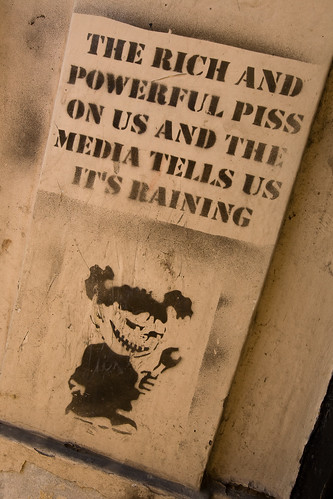Like most of you, I spend most of my days weeping at the fate of rich. But I don’t think I’d realised how bad things were, until I came across Gabriel Sherman’s definitive account.
You should probably get your senior executive assistant to read you the whole thing, but if you’re been forced to cull the hired help, the key themes are: (i) Make sure we, the rich, are paid more than anyone else, even if we go bust. (ii) Don’t expect us to foot the bill from the bailout – tax the sheeple instead. (iii) Money isn’t enough – we demand deference and respect.
Here are some of the quotes that made me tear up:
Citigroup exec: “No offense to Middle America, but if someone went to Columbia or Wharton, [even if] their company is a fumbling, mismanaged bank, why should they all of a sudden be paid the same as the guy down the block who delivers restaurant supplies for Sysco out of a huge, shiny truck?”
Bankrupt Wall Street exec: “I think [Obama] doesn’t have an appreciation for how hard it is to build these companies, the blood, sweat, and tears that goes into them. It’s just that he has no passion for it.”
Bear Stearns senior managing director: “Honestly, you can pick on Wall Street all you want, I don’t think it’s fair. It’s fair to say you ran your companies into the ground, your risk management is flawed-that is perfectly legitimate. You can lay criticism on GM or others. But I don’t think it’s fair to say Wall Street is paid too much.”
Wall Street exec: “Why are [we] being punished for making a lot of money?”
Hedge fund guy: “The government wants me to be a slave!”
Another hedge fund guy: “JPMorgan and all these guys should go on strike—see what happens to the country without Wall Street.”
I’d also highly recommend reading the Economist’s typically incisive analysis. The stakes are high, it warns. Raise taxes on the rich and you’re on a slippery slope towards fascism, genocide and global conflict:
Barack Obama has suggested raising the tax rates on high earners and closing loopholes such as the carried-interest privilege enjoyed by private-equity managers. Such tax changes may suit the public mood. The danger is that popular anger, once released, can fasten on targets beyond the rich; immigrants, say, or foreigners generally. The 1930s Depression led to fascism in Germany and the second world war. Even if such apocalypses are avoided, the anti-rich backlash can [still] go too far.
So, repeat after me, “They came first for the rich, and I didn’t speak up because I wasn’t rich. Then they came for the Jews…”





